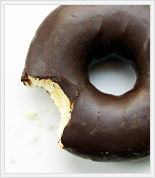|
|
Sweets & Weight Loss
QUESTION:
I am starting my weight loss program and I am not sure whether or not I should still eat sweets. Is it okay to eat sweets occasionally or do I need to eliminate them completely?
ANSWER:
 This is a good question, but unfortunately there is no easy answer. Your decision will have to be based on your past experiences with sweets. Some individuals find that they have certain foods that trigger uncontrolled eating. These foods are referred to as "trigger foods". For example, you may find that the consumption of a donut always leads to overeating. In other words, you can't seem to stop at one or two and end up eating the whole dozen! Some individuals are sensitive to the consumption of simple sugars and will find that by eating sweets, they actually end up craving more sweets. This is a good question, but unfortunately there is no easy answer. Your decision will have to be based on your past experiences with sweets. Some individuals find that they have certain foods that trigger uncontrolled eating. These foods are referred to as "trigger foods". For example, you may find that the consumption of a donut always leads to overeating. In other words, you can't seem to stop at one or two and end up eating the whole dozen! Some individuals are sensitive to the consumption of simple sugars and will find that by eating sweets, they actually end up craving more sweets.
In the early stages of a weight loss program, it is often beneficial for individuals to refrain from eating foods that they have identified as "trigger foods". However, once the destructive cycle of food abuse has been broken and new habits formed, these foods can be re-introduced and monitored. Ideally, as you progress through your program, all foods can be eventually included in your diet. A good rule of thumb is that about 90% of your daily caloric intake should be from nutrient-dense foods and about 10% of your calories can be used for extras, such as dessert.
However, on the flip side, some people find that any restriction of food leads to increased obsession with it and subsequent overindulgence of the restricted food. The "un-dieting" approach is based on the theory that no food should ever be restricted, and with time, food obsession will lessen and the cycle of overeating will be broken. Only you can decide, based on your personal history, what approach will work best for you. Experiment with different methods and know that the underlying issue with trigger foods is almost always emotional, behavioral or habitual; therefore, focus the majority of your energy on trying to fix these underlying problems.

Related Articles:
|
 |
 |
Our expert, Dr. Sharon E. Griffin, holds a B.S., M.S., and Ph.D. in the areas of exercise science/physiology. She also holds a second M.S. degree in Nutrition and is a licensed nutritionist and an ACSM certified health and fitness instructor.
|

